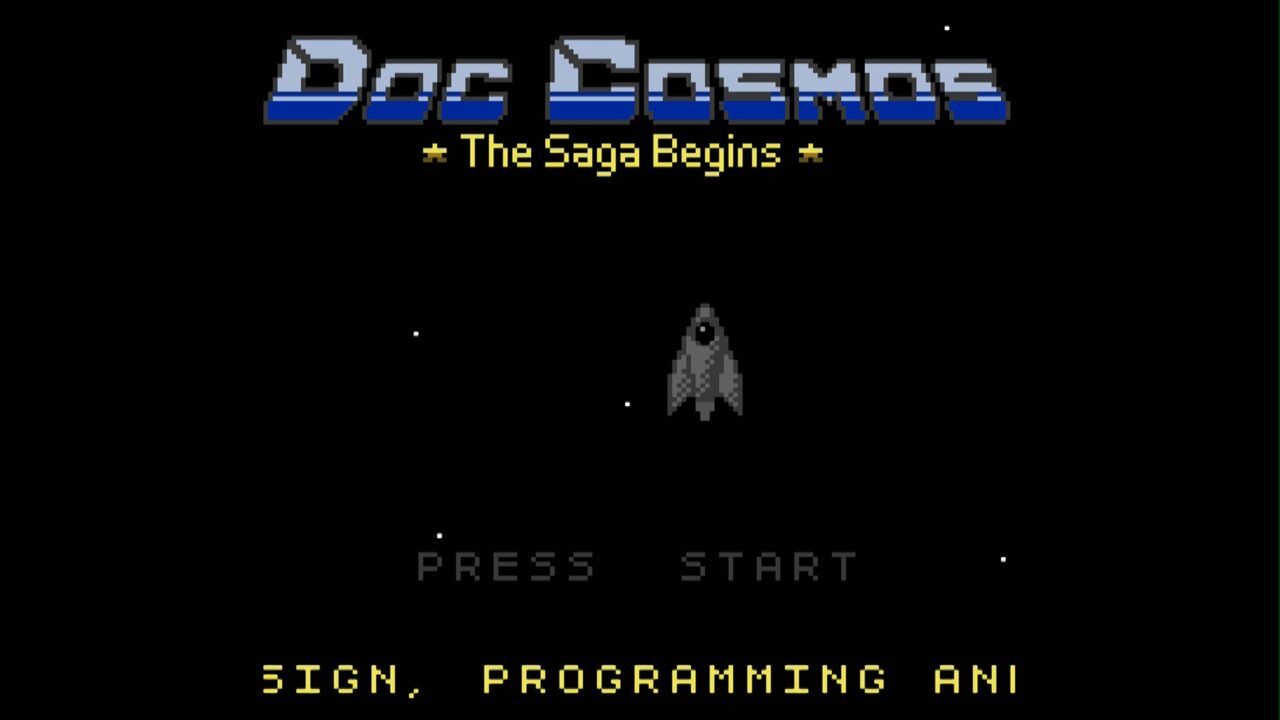Story:
Doc Cosmos is in search of an alien artifact that is rumored to allow the user to time travel. After travelling to the alien planet where it was last seen and obtaining it, Doc finds himself lost in the labyrinth of the underground complex

Gameplay:
Doc Cosmos is a platforming adventure game where you have to manipulate time in order to traverse the complex. You can manipulate time with the press of a button and doing so changes the entire aspect of the game. When in the past, enemies will have less detail, and in some cases even fewer enemies on screen, while everything will have a monochrome look to it, and Doc will become what looks to be a stick figure.
Eventually, the monochrome look in the past will become full color once you get to a certain point in the game. Not only does the entire look of the game and the way the game plays change when going through time but also the layout of the game. Going into the past may cause a cave to disappear or a ladder to appear where it wasn’t there before.
When Doc is in his stick figure form of the past, he will be able to jump pretty far but not very high. Alternatively, when Doc is in the present, he can jump higher than in the past, but not very far. Jumping between time is a core mechanic of the game and will be required to get certain keys that are needed to get through doors to progress to the next area.
These keys and doors are color-coded so it’s easy to keep track of what keys you need to progress. You start with four lives and if you lose them all, it’s game over and you have to start over. Jumping through time is also limited to up to three times and can be replenished at power stations that you will find throughout the complex.

Graphics and Performance:
Doc Cosmos is graphically pretty impressive for a GameBoy Color game. Every screen is very detailed with environmental effects, well as much as there can be on a handheld that came out in the 90’s. Enemies are well animated and Doc himself is quite detailed and well animated. When going into the past and having everything look primitive looks really nice and is kinda shocking when you experience it for the first time.
As for performance, well it’s better than I had initially thought it would be. With as large of an impact the mechanic of switching between time periods has on the game, I expected performance issues. I thought the game would show signs of slowdown and/or cause flickering of the sprites, but none of that happens.
Transitions between screens are fast and responsive. The changes to the game as a result of the time mechanic are pretty much instant and all of this has zero impact on the game’s performance. For a Gameboy Color game, this is truly an impressive flex of optimization

Sound:
The in-game music that is played in the present is very catchy and doesn’t sound like your typical chiptune music as most GameBoy games seem to have. It sounds smooth and very well done. When it comes to the music played in the past, it is kinda jarring. You see, gone is the smooth playing music and it’s replaced by a hard and crunchy-sounding track.
When I first heard it, I initially thought the game was broken and half expected the game to lock up on me. But to my surprise, that wasn’t the case. There is just so much attention to detail that even the music track was made to sound primitive when playing in the past timeline which coincides with the graphical style.

Conclusion:
Doc Cosmos for the GameBoy Color is a wonderful platforming game. Boasts one the cleanest and most modern soundtracks I have ever heard on a GameBoy Color game. Has what at first is perceived to be a gimmick mechanic and turns out to be a very fun and exciting tool to help navigate through the game.
If you’re looking for a fun and engaging platforming game to pop into your GameBoy Color or to play on your favorite emulation platform, you have to check this game out!
Disclaimer: A review copy was provided by Bitmapsoft
In addition to writing articles, Ryan Byers also creates content for his YouTube channel called "Obscure Games and Consoles", collects video games, and dabbles in video game development.


